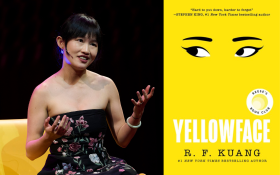While the book industry watched nervously last month as bookshops announced their Christmas favourites and the yearly race for the festive number-one slot kicked off, heads were turned by Amazon’s launch of its e-book reader, the Kindle.
The Kindle, which Amazon claims to be capable of downloading books in less than a minute and makes use of the latest in electronic paper displays, is only the most recent in a number of digital devices that includes the Sony e-book Reader and the iRex Iliad.
These devices seem to offer a phenomenal new approach to reading. ‘For people on the go’, says Steve Haber, senior vice president of Sony’s Digital Imaging and Audio Division, ‘this device is compelling because it allows them to carry a wide variety of reading materials whether they are on a cross-country flight, in a doctor’s office waiting room, or at a beach resort.’ Not only are books downloadable in any location covered by the wireless network used (in the US at least) the range of books available seems to have expanded greatly in the last year or two since they became available.
Sony claims that the Reader’s library potential is practically limitless, having the capacity to store up to 160 typical eBooks as well as expansion slots for Memory Stick Duo™ media or SD memory cards. And Amazon claims that the Kindle online store has 90,000 books on offer, including 101 of 112 New York Times bestsellers.
The plus sides are indisputable. At the most basic level, these devices are small enough to fit in your handbag, something for which, as a reader with a predilection for classic tomes like War and Peace and Clarissa, I cannot sufficiently express my gratitude. Furthermore, the idea of having every reference and resource you desire at your fingertips, no matter where you are, is hugely seductive. Finally, in an age in which we are beginning to understand the finite nature of the planet’s resources, any step towards paper-free technology must, surely, be welcomed with open arms.
So why haven’t these devices truly taken off? The answer lies in the complex web of legal and traditional ties that lies behind the book publishing industry. First of all the issue of copyright must be addressed. One of the most loudly voiced complaints about the Sony Reader has been its complicated digital rights management restrictions, which limit the proliferation of the digital file, once it’s been downloaded.
Secondly, that old complaint, the backwardness of the book industry raises its head again. The same difficulties that apply to ambitious digital library schemes, such as the Google books library project and the Open Library, are relevant here. The Open Library, which aims to build an online catalogue of every book ever published anywhere in the world, is facing reluctance in the book world. Libraries, including the British Library are resisting allowing Open Library access to their catalogues, through what seems to be little more than a fear of relinquishing control over the information. And the publishing industry is similarly failing to embrace the possibilities of digitisation. After all, in the context of 291,920 books published in 2006 in the US alone, 90,000 available digital titles simply isn’t very many.
The traditionalist recoil from digitisation is easy to understand. Nightmarish images of barren libraries and deserted bookshops fill book lovers everywhere with dread. The fear is that the digital book will make the tangible book obsolete, just as the Gutenberg press made the illuminated manuscript obsolete. The real likelihood, however, is not so much the disappearance of the book per se, but the disappearance of the paperback.
There will always be a demand for beautifully made, hardback, leather-bound books, no matter what happens to book technology. And there will always be libraries and bookshops full of rare and valuable books. There may not, if the ebook truly becomes successful, always be a demand for cheap, transportable paperbacks.
But is this really a dire loss? The paperback, after all, was championed for its accessibility. It was the vision of Allen Lane in the 1930s to make books available everywhere (by which he largely meant at railway stations as well as on the high street) and for everyone. This vision led to the launch of the Penguin imprint and its hugely successful paperback range.
Paperbacks hold little value in terms of materials, they are cheaply made and don’t last. Their main benefit is their comparative lightness and disposability. The ebook is nothing more than a development of this process. It’s a facilitation. It doesn’t represent a change in attitude to books, simply a change in form, more appropriate to the environmental concerns and demands for accessibility of the twenty-first century.
Finally, with this new shift towards digitisation comes a hope for greater diversity. The publishing industry has narrowed and narrowed in recent years to be dominated by the big publishing houses and all-powerful bookshop chains. Thanks to the paperback we all read more. In recent years, however, we have begun to read more of the same thing. There is a real likelihood that the digital book will buck this trend, releasing the stranglehold that bookshop demands have on publishing and allowing an evening out of the playing field. The result, hopefully, will be a greater potential for word-of-mouth and merit-based sales. With luck, in Christmasses to come, the eyes of both the consumer and the publisher will be distracted from those few coveted and highly priced slots on bookshop tables and in promotional Christmas catalogues towards the real diversity and quality of material that is published every year.
*For more about the Kindle pictured above, visit: amazon.com/Kindle-Amazons-Wireless-Reading-Device/dp/B000FI73MA




